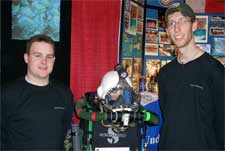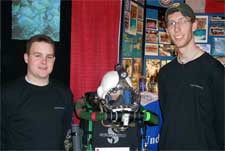 Warwick, East Providence residents collaborate with Ocean Opportunity
Warwick, East Providence residents collaborate with Ocean Opportunity
KINGSTON, R.I. – March 10, 2008 – One drawback to scuba diving has always been the short duration that divers can spend underwater before returning to the surface for additional air tanks. But thanks to the work of two University of Rhode Island students and a Providence-based non-profit organization, an advanced technology may soon be available so divers can dive longer on one tank of air.
Andrew Valainis of Warwick and Travis Barao of East Providence, both juniors studying ocean engineering, have been working with Michael Lombardi, founder of Ocean Opportunity, to improve the “rebreather” device.
“The rebreather is a type of scuba apparatus that takes the air you exhale and keeps it within the apparatus, pushes it through a carbon dioxide scrubber to clean the air, and then recycles it for you to rebreathe,” explained Valainis. “It allows for longer dive durations and uses considerably less gas than conventional techniques.”
Early versions of the rebreather technology were developed by the Navy during World War II, but there has been little advanced research on it in recent years.
“There are no standards for rebreather development and manufacturing across the market, so we’re trying to set the standard,” Barao said. “Other versions have hoses going to different spots and different ways the gases flow through the unit. We’re trying to organize the unit and standardize it.”
To do so required a great deal of research on early versions of the technology, much of which was conducted by Valainis. Then both students developed computer models and designed new parts using Solid Works, a software program they were trained to use through their URI coursework. The computer models of the final product are being used to market the device to manufacturers and other companies.
Valainis and Barao joined Lombardi on March 8 at the Boston Sea Rovers trade show in Boston to introduce the device to potential customers.
The students’ involvement in the project began simply by applying for an internship at Ocean Opportunity. Both had the required background in ocean engineering, along with enthusiasm for the project.
“Andrew and Travis have played instrumental roles in this project,” said Lombardi. “They provided much of the needed engineering technical skill sets to drive this project over the past year. Both are excellent representatives of the student talent within the University’s Ocean Engineering department, and I am sure that both students will move on to exceptional career paths.”
Barao, a former hockey player at East Providence High School, is involved in the URI Scuba Club and has gone on nearly two dozen dives around the region since being certified 18 months ago. He’s also one of the managers at the URI computer store. While continuing to work on the rebreather project, he hopes to also participate this summer in an internship through The Nature Conservancy studying forage fish in Rhode Island waters.
In addition to ocean engineering, Valainis is also studying Spanish and international development as part of the URI International Engineering Program. He will spend the 2008-2009 school year in Spain studying at the University of Cantabria for a semester and interning at an engineering company for six months. He hopes to earn his scuba certification this summer before leaving for Spain.
Valainis is president of the URI chapter of the Marine Technology Society and co-founder of the URI chapter of Schools for Schools, which raises funds to benefit needy schools in the war-torn region of northern Uganda. He also works as a lab technician at SubChem Systems, a small company in Narragansett started by a URI professor that makes a device that analyzes the chemical nutrients in seawater.
Neither student has a firm idea of what his future holds. Barao is considering graduate school and may end up designing equipment used in the growing renewable energy field, while Valainis’ options include the Peace Corps and graduate school leading to a career that focuses on climate change.
Pictured above
Travis Barao (left) and Andrew Valainis

